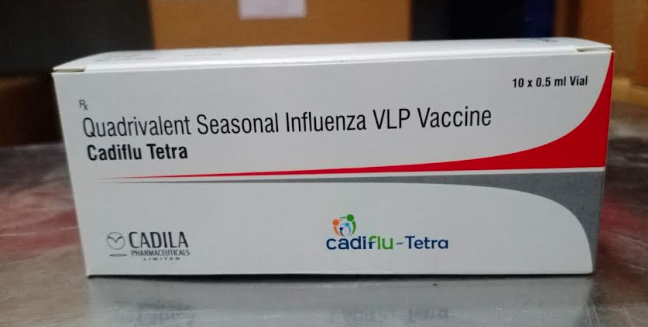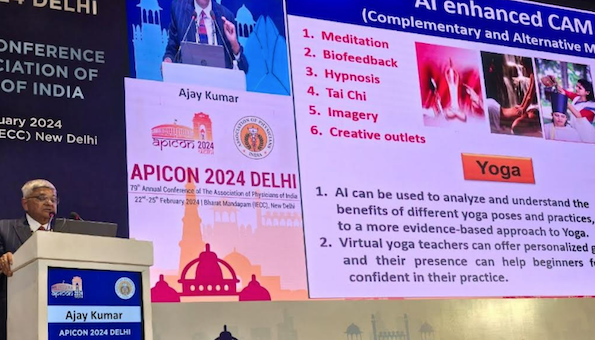“There is a significant gap in the infrastructure required for AI implementation”
01 March 2024 | Views | By Amguth Raju
With the extensive and ubiquitous presence and penetration of Artificial Intelligence (AI), the future seems more dependent on this technology in the life sciences industry. In an interaction with BioSpectrum, Sankara Venkata Krishna Prasad, Founder, CEO and Managing Director of Cito Healthcare, who is also an industry analyst, shared his views on the impact of AI on pharma, biotech and the healthcare industry.

Artificial Intelligence (AI) has completely changed the way we see the world today. How do you see AI revolutionising drug discovery in the pharmaceutical industry? Can AI help in discovering new drug molecules that could help treat deadly and chronic diseases like cancers and AIDS?
The future of human life is completely impacted by AI. Particularly its emergence in the healthcare and pharmaceutical industry will have a vital impact on disease control and new drug discoveries. AI is poised to revolutionise drug discovery in several ways. It can drastically reduce the time needed to discover and develop new drugs. AI can be used to help suggest novel combinations for treating fatal diseases and even predict treatment outcomes. Additionally, AI facilitates personalised medicine by tailoring treatments to individual patients, which can ultimately speed up the development of new therapies.
What are the key challenges in implementing AI-driven solutions in healthcare, particularly in the context of regulatory compliance?
I feel, the pharma and healthcare organisations in India are yet to gear up for AI. Many are still in the process of adapting to the advancements in the pharmaceutical industry brought about by digitalisation. Despite this progress, the majority of Micro, Small, and Medium Enterprises (MSMEs) are not adequately prepared to integrate AI into their operations. AI adoption, beyond platforms like Chat GPT, remains in its infancy and requires further exploration and validation. Moreover, there is a pressing need to harmonise regulatory compliances, particularly in manufacturing standards outlined by the International Council for Harmonisation (ICH). This entails the implementation of electronic documentation systems and global alignment on regulatory practices to ensure both qualitative and compliant manufacturing and healthcare delivery systems. Additionally, there is a significant gap in the infrastructure required for AI implementation, including the necessary hardware, software, and skilled professionals, which remains to be addressed.
Can you discuss a specific example where AI has been successfully utilised to discover or develop a new drug?
Although AI is currently making strides in drug discovery, its continual evolution opens up a multitude of possibilities in terms of drug candidates, their structures, and the discovery process. This versatility allows for the pinpointing of targeted molecules tailored to specific therapies or multiple therapeutic discoveries. A recent example highlighting this potential is Insilico Medicine's Pharma.AI, which is revolutionising drug discovery with its suite of AI-powered tools. PandaOmics, for instance, drastically reduces the time required for multi-omics target discovery, from several months to a few clicks. Similarly, Chemistry42 employs machine learning for de novo drug design, generating lead-like molecules within a week. Additionally, InClinico provides an invaluable tool for efficient clinical trial management, identifying potential weaknesses in trial design and predicting success rates. Collectively, these tools are streamlining the traditionally lengthy drug discovery process, accelerating the pursuit of breakthrough medicine.
How do you envision the role of AI evolving in personalised medicine and patient care?
I believe AI could be groundbreaking by using large amounts of data from healthy and sick people. It could help analyse specific therapeutic segments quickly to see how drugs work over time and improve their formulations. It would also support Phase IV clinical trials, especially in monitoring drug safety (Pharmacovigilance). Overall, AI in personalised medicine and patient care has the potential to improve healthcare, make treatments better, and give patients more control over their health.
What are the ethical considerations that need to be addressed when deploying AI in healthcare settings?
The primary concern lies in protecting patient identity, which can be achieved through AI by masking identities in documentation, albeit in previously challenging areas. The rigidity and security levels of AI coding stand out as effective measures for safeguarding patient identity compared to traditional masking systems. However, the implementation of AI-driven solutions in healthcare, particularly concerning regulatory compliance, presents various challenges and ethical considerations. These include ensuring data privacy and security, adhering to diverse regulations, deciphering complex AI algorithms, managing the time and cost implications, addressing potential biases perpetuated by AI algorithms, integrating solutions into existing systems, navigating complex ethical and legal considerations, determining accountability and liability for decisions made, preserving patient autonomy and consent, and conducting real-time reviews for corrections.
How can AI help address the challenges of drug resistance in infectious diseases?
The emergence of drug resistance in infectious diseases poses a significant healthcare challenge. However, AI offers a promising solution by playing a crucial role in addressing this issue. Through predictive analytics, AI can forecast which drugs may become ineffective against evolving pathogens, allowing for proactive adjustments in treatment strategies. Furthermore, AI aids in the discovery of alternative treatments, the development of more effective medications, and the customisation of treatment plans tailored to individual patients. By providing real-time insights into the changing landscape of drug resistance, AI enables healthcare professionals to adapt swiftly, ultimately enhancing the efficacy of treatments and improving patient outcomes.
What strategies can be employed to ensure the fairness and transparency of AI algorithms in healthcare decision-making?
To maintain trust, mitigate bias, and foster equitable outcomes, it is crucial to prioritise fairness and transparency in the use of AI algorithms for healthcare decision-making. Some of the strategies to achieve this include ensuring transparency of both data and algorithms, promoting diversity and inclusivity in the development process, conducting external validation and evaluation, and establishing regulatory frameworks and guidelines.
How do you see AI impacting the accessibility and affordability of healthcare services globally?
While AI offers significant potential for improving the accessibility and affordability of healthcare services on a global scale, there are challenges to overcome. These include ensuring fair access to AI-driven technologies, addressing concerns regarding data privacy and security, and navigating regulatory and ethical issues. Collaboration among various stakeholders, such as governments, healthcare providers, technology developers, and community organisations, is vital to fully realise the benefits of AI in enhancing healthcare accessibility and affordability worldwide.
What are the key factors hindering the adoption of AI in pharmaceutical research and development?
Pharmaceutical companies face several challenges when it comes to using AI in research and development. Firstly, they require high-quality and comprehensive datasets to effectively train AI models. Secondly, they must adhere to strict regulatory guidelines set by government agencies. Additionally, pharmaceutical companies often possess proprietary data and intellectual property that may not be easily compatible with AI systems. Finally, the significant investment required to implement AI technology presents a barrier to adoption for many companies in the industry.
Can you discuss a case where AI-driven predictive modelling has significantly improved clinical trial outcomes or drug efficacy in the Healthcare system?
It's important to note that using AI in the healthcare system, along with a thorough review of relevant literature from sources like PubMed/Medline, Scopus, and EMBASE, is significant. Integrating AI into healthcare has the potential to greatly improve disease diagnosis, treatment selection, and clinical laboratory testing. AI tools can analyse large sets of data and find patterns, outperforming humans in many healthcare tasks. AI brings higher accuracy, lower costs, and time savings, while also reducing human errors. It can revolutionise personalised medicine, optimise medication dosages, improve population health management, set guidelines, offer virtual health assistants, support mental health care, enhance patient education, and strengthen patient-physician trust.
For example, AI can be used in Therapeutic Drug Monitoring (TDM) by using machine learning algorithms to predict drug-drug interactions. By analysing large sets of patient data, these algorithms can detect potential drug interactions. This helps to decrease the risk of adverse drug reactions, reduce costs, and improve patient outcomes.
Amguth Raju
hyderabad@mmactiv.com

















